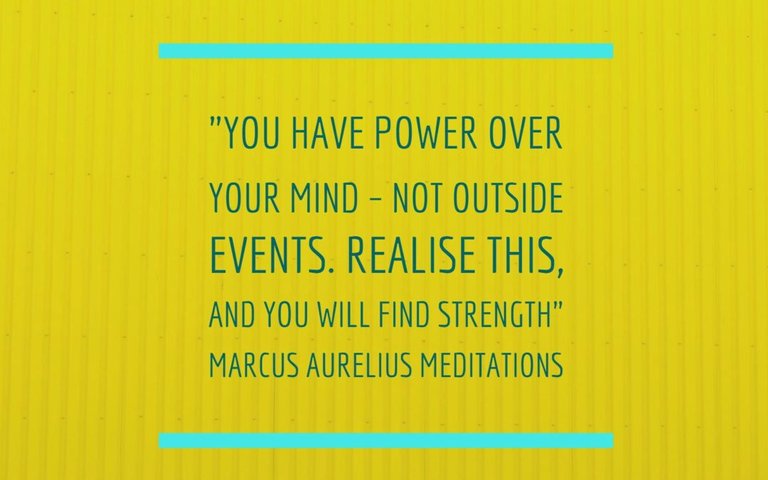
Resilience training is unusual in that it is not seeking to solve a particular problem, or stop a particular problem from arising; rather it is seeking to inoculate against the ill effects of problems in general. Ordinary well being is similar and (for me) is premised on there being a level of well being that is more foundational than the drama of our thinking minds.
This, by the way, is my way of seeing things and not necessarily true. It would be quite possible to use the same cognitive tools to promote wellbeing without conceptualising anything more than neurons in motion.
Resilience becomes a way of receiving the slings and arrows of outrageous fortune, rather than a way of avoiding them. Avoidance often being a behaviour and a strategy that sustains a problem rather than solving it. For example if I am shy about going to parties and avoid them then I continue to be shy and may become anxious if more pressure is put on me. The avoidance which makes me feel better in the short term becomes part of the problem.
The notion of 'receiving' is a core concept of (Chinese) martial arts and is about skilful use of body and mind rather than being passive or overwhelmed. So resilience is showing up to what life has on offer at the time. Such showing up is not a casual affair but may be grounded in various psychological skills and techniques that have been practised until readily available under stress, or deeper mindful insight into the flow of thought and feeling, which in my view also requires sufficient practice until it becomes a resource available during times of need.
Deliberately living life in this way doesn’t mean we won’t ever feel bad or fall apart for a while. It does mean that we will wake up to how life is and find our balance again more quickly. In finding our balance we continue to engage with what life has brought us. We engage and receive with more of ourselves, if that makes sense.
This next comment is not one of my more evidence based ones although it does begin from some interesting data from Jordan Peterson.
https://www.youtube.com/watch?v=-5RCmu-HuTg&t=3570s
Near the beginning of the talk Peterson shows how social constructs - the domain of social psychology - can emerge from biology. He gives an account of how lobsters have social hierarchy. It is far more interesting than the topic of 'lobsters' suggests.
I take this notion of embedding and emerging. Thus the social construct, that is all the thoughts and beliefs we have about a context in life emerge from our biology. We are able to think in such a way only because our brains are such a way.
I apologise for my stunning lack of any significant grasp of science.
As far as I can see, this is the point science stops. There is no more, and no more is necessary that the biology giving rise to whatever neurons need to do to get through the day. This is a point of view that has had tremendous benefit in terms of generating perspectives and techniques that allow us to change our thinking and feeling. I am not knocking it and still practice mainly in terms of cognitive behavioural hypnotherapy and coaching.
Personally, I think / hope / have faith that there is another level of embedding, a deeper creative potential from which our biology emerges and in which it is embedded. In Chinese philosophy it is the Tao, out of which all manifest things in the world are born; in the Three Principles understanding, it is called Universal Mind. I do not consider that such a notion can be proven as it is by definition not definable and just not in the domain of scientific method.
And that seems fine to me, there is enough amazingly useful stuff that is within the scientific domain, and this includes studies of such areas that might not have been thought to be, such as 'consciousness' and so called 'enlightenment experiences'. Scientific method gives us amazingly well evidenced ways of doing things, so as an example, if someone suffers from anxiety, there are very simple cognitive skills that can be learned and practised to change the person's daily experience.
There is also a deeper (the old metaphor groans again) reality available and that can be approached through various means and paths, not all of which agree with each other. For example the Three Principles community tend to decry what would only be common sense for a Buddhist practitioner. Each has their reasons - take your pick, or even better pick and mix for you in your unique circumstances.
Personally, I have a sympathy for deliberate and sustained practices - you might not. 'Go figure', as the saying goes! We are all the same and yet unique expressions of life. I would suggest there is a direction to look in, and that direction takes us towards joy and kindness which emerge from us even as they can also be cultivated. Life does not seem to care overmuch about what seems a paradox to me...
So what to do about what you have read? Well, I would recommend this book as an example of one way of seeing resilience that I find quite valuable and accessible. Resilient: 12 Tools for transforming everyday experiences into lasting happiness or my own book,Stress Less: It's the road less travelled for a reason
And if this is something you would find useful to explore further you could book a free initial coaching session You will find more information about that if you follow the link. Finally, make this a conversation. What do you think? Please add your comments here on the blog post.